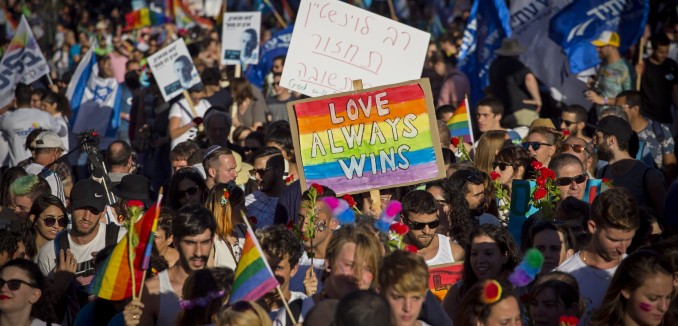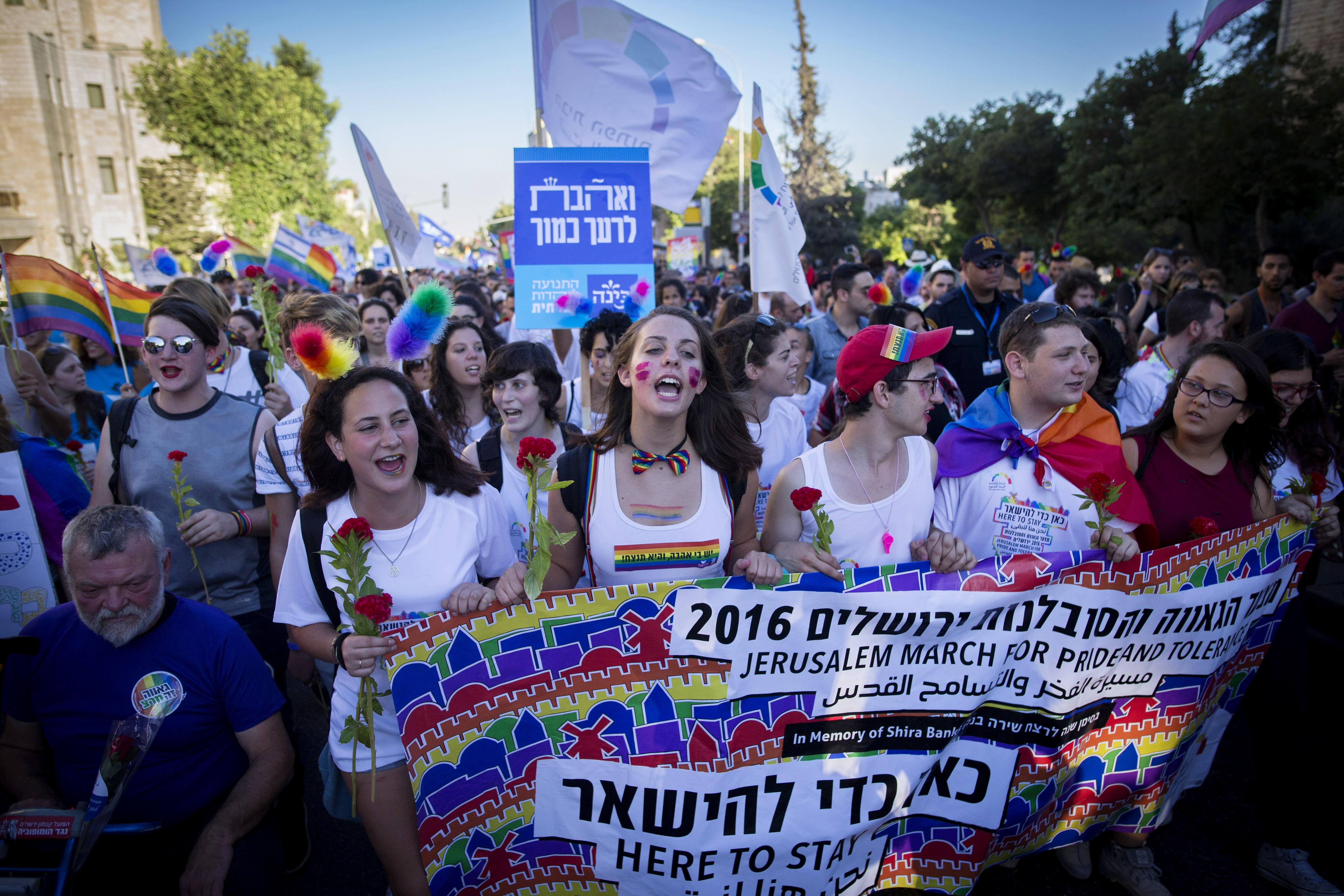Over 25,000 people participated in Jerusalem’s 15th annual LGBT pride parade on Thursday, the largest such event to ever take place in the Israeli capital.
Participants first gathered in Jerusalem’s Liberty Bell Park at 5:45 PM, then chanted and marched with banners calling for equality along the city’s downtown area, much of which was closed off to vehicles.
Knesset members from various political parties — including Likud, Zionist Union, Meretz, and Yesh Atid — were also in attendance.
“This is a day of love and happiness,” said Yair Lapid, chairman of Yesh Atid. “I think that the ability to accept others is the basis of human society. Anyone who is unable to accept that—they’ve got a problem.”
Minister of Public Security Gilad Erdan of Likud echoed these sentiments, saying before the march: “We live in a Jewish and democratic state, I grew up in a religious household, and I graduated from a yeshiva high school. The most important principle that we were taught was ‘Love your neighbor as yourself—this is the whole Torah,’ and this is the thing that has kept the Jewish people throughout the generations.”
“My expectation of rabbis and leaders of this community is that they be a unifying voice, a voice that consolidates, of tolerance, of accepting the other and the different. A voice of unity and not of division and hatred,” he added.
Some 2,000 police officers were deployed to safeguard the event, which was marred by the deadly stabbing of 16-year-old Shira Banki by an ultra-Orthodox extremist last year. Parade participants had to undergo two security checks, and police said they arrested some 30 people on suspicion of attempting to harm the marchers.
Parade organizers requested that participants bring flowers to the site where Banki was murdered last year. Banki’s mother and father, who attended this year’s parade, met earlier this week with President Reuven Rivlin and stood beside him as he spoke out against incitement targeting the LGBT community.
Crowds at the spot where Shira Banki was murdered at last year's Jerusalem pride parade. pic.twitter.com/JTKTWiLUSb
— Jeffrey Goldberg (@JeffreyGoldberg) July 21, 2016
Jerusalem’s mayor, who controversially decided not to attend the parade due to objections from ultra-Orthodox residents of the city, visited the area where Banki was killed to pay his respects. “I pray with all my heart that on this day, we will all of us unite against any display of incitement,” he said.
In a video message, Prime Minister Benjamin Netanyahu extended his support to the marchers, saying: “For too long, the LGBT community around the world has faced violence and intimidation.”
“Surrounding us are regimes who literally murder you for being gay. In Israel, the LGBT community marches with pride,” he added. “Whether you are marching today or not, I ask you to stand in solidarity with our brothers and sisters in the LGBT community.”
Over 200,000 people gathered in Tel Aviv to participate in the region’s largest gay pride parade last month. “The sun is out and everybody is partying and having fun, the atmosphere is great,” Christian Tummann, a German tourist, told the Associated Press at the time. “I feel so happy, so happy, that I can go to the Middle East and still be proud, it’s very nice,” added Dona Ulzen, who was visiting from Sweden.
A survey carried out by the advocacy group Hiddush ahead of Tel Aviv Pride found that 76% of Israelis believe that civil marriage should be available for same-sex couples. Days before the poll was published, Ta’alin Abu Hanna, a 21-year-old Catholic Israeli-Arab, was crowned the first winner of the Miss Trans Israel pageant.
“If I had not been in Israel and had been elsewhere—in Palestine or in any other Arab country—I might have been oppressed or I might have been in prison or murdered,” Abu Hanna said at the time. “Our country allowed me, a Christian Arab from Nazareth, to end the war between my soul and my body.”
For more on Israel’s strides in granting rights to its LGBT citizens and residents, read The Persistent Progress of Israel’s LGBT Community, in which Corinne Berzon discusses the advances LGBT individuals in Israel have made in gaining mainstream societal acceptance, and the challenges their community continues to face.
[Photo: Yonatan Sindel / Flash90]





